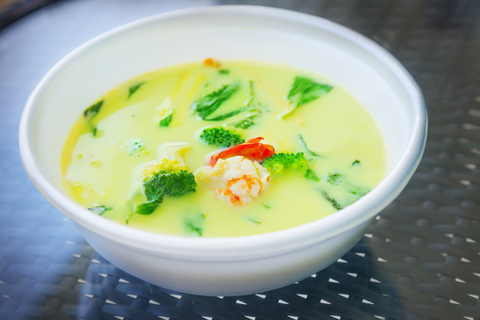Should You Join the Souping Revolution?
Cleansing and detoxing diets seem to be here to stay, and juicing is the newest addition to the long list of detox diets. Think of souping as juicing but warm… and with even more nutrients!
Souping is a diet where you eat soup and nothing but soup for a day or longer. Proponents claim it will cleanse your body and give it a break from the “hard work” of digestion.
What are some of the benefits of souping?
Souping could be healthy or unhealthy. It all depends on what’s in your soup!
Eating soup regularly can help people get more fluids. This is great for people who don’t drink much water.
Soup is a great way to use up vegetables that are getting wilty so it can save you money on your grocery bill and minimize food waste.
Is souping healthier than juicing?
I’m not a fan of using juice to replace meals for a few reasons. Juicing your vegetables and fruit removes the fiber, which you need for healthy gut bacteria, a strong immune system, preventing certain cancers, controlling your weight and preventing heart disease and type 2 diabetes. Because you’re taking away the fiber, juicing leaves behind plenty of sugar with nothing to slow it down. This puts your blood sugar on a roller coaster, leading you more prone to cravings, crankiness and crashing energy levels.
Souping is healthier than juicing because you’re using the whole vegetables in your soup. You’re getting this fiber and hopefully even more fiber from whole vegetables, whole grains and beans or lentils.
If your soup is a meal and not just an appetizer, it should also include a source of protein and healthy fat for staying power. Including protein in your soup also helps prevent muscle loss, which is especially important if you’re active, trying to lose weight, and as we age.
Does soup help you lose weight?
Studies have shown that eating soup before your meal can help you eat less without going hungry.
How does it work? A healthy soup will be low in calories but take up room in your stomach, causing you to feel full even though you haven’t eaten much.
Also, it takes time for your stomach to send a message to your brain that you’re full – by starting your meal with soup, the message will arrive sooner than it would if you dive straight into the main course. This seems to be a more reasonable approach than having only soup to replace all of your meals.
Will souping fill you up more than a juice cleanse?
Soup helps fill you up because it has a large volume for relatively low calories (depending on what’s in it, of course). Soup is mostly water, which fills your stomach and provides 0 calories. The fiber from any vegetables and other ingredients also keeps you fuller longer.
Soup also takes longer to eat than other meals because you have to wait for each bite to cool down before you slurp from your spoon. It takes about 20 minutes for your brain to recognize that you’re full, and soup helps you slow down and pay closer attention to feelings of fullness.
Warm foods tend to be more satisfying than cold foods and chewing is more satisfying than drinking only fluids all day. This could help explain why eating soup rather than just drinking juice could be more filling and more satisfying.
What ingredients should you put in your soups to help fill you up?
Make sure your soup has protein, fiber and heart healthy fats for a satisfying meal.
To make sure your soup has staying power, include a source of protein.
Protein sources: try chicken or turkey breast, eggs, lean meat such as bison, 95% lean ground beef, pork tenderloin, fish or seafood such as shrimp and scallops, Greek yogurt, nuts and seeds.
Fiber-rich foods: add lots of vegetables in different colors, whole grains such as barley, wild rice or millet, beans and lentils
Healthy fats: try incorporating avocado, cashews, almonds, tahini or olive oil into your soups for heart healthy fats.
Flavor boosters: Spices, herbs, seaweed, mushrooms, onions and garlic: not only do these ingredient offer tons of health benefits, they take your soup’s flavor to the next level.
What about some of the downsides of using a souping program to detox?
Whether you’re preparing your own soups for a souping cleanse or buying them, it’s unlikely your souping plan has had its nutrient profile reviewed by a dietitian.
The result? You’re probably missing out on important nutrients that could negatively impact your health over time.
You shouldn’t try souping for more than a day. This plan is especially dangerous if you’re pregnant or breastfeeding, or you have diabetes or other health problems.
Soup cleanses tend to be too low in calories.
The idea that our bodies are toxic and that detox diets help clean us out doesn’t have any evidence to back it up. Often I’ll hear clients say they felt good after a detox but it’s because they cut out processed foods and alcohol and ate more vegetables. You can do this without limiting yourself to just soup or going on a detox.
Your kidneys, liver and other organs work together to help you detox and you can support them with foods and beverages that naturally detoxify, such as green leafy vegetables and plenty of water.
Rather than go on a detox and then a retox… going back to your old ways of eating less healthy foods… try to be as healthy as you can 80% of the time and leave room for some treats 20% of the time. Exercise, sleep well and manage stress, and your body will take care of the rest.
“Should You Join the Souping Revolution?”, Written for Vertex Fitness Personal Training Studio by Ashvini Mashru, RD
Request a complimentary first session at Vertex Fitness, Voted the BEST Personal Training Studio on the Main Line
Click HERE and we will schedule a session to try it yourself








cindy dobroskay
February 11, 2017 7:46 pmEnjoyed this article. Totally agree about detox diets. I never recommend them. Our bodies were designed to detox if we eat right.